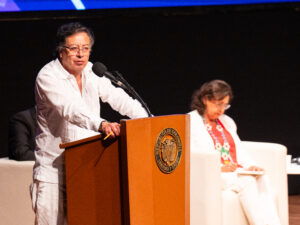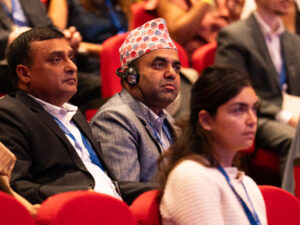Reducing the health risks from air pollution
The Second WHO Global Conference on Air Pollution and Health has concluded with major commitments from over 70 countries, cities and organizations ready to tackle air pollution and safeguard health.
Jointly organized with the Government of Colombia, the Conference brought together more than 700 participants from 100 countries, including government representatives, UN agencies, civil society, scientists, and health societies, to accelerate air pollution and health action.
High-level leaders agreed to cut air pollution-related health impacts by 50% by 2040, which could save millions of lives every year. Governments and partners announce new funding commitments to back their pledges.
At the high-level session, WHO Director-General Dr Tedros Adhanom Ghebreyesus challenged leaders to respond to the global call to action: “It is time to move from commitments to bold actions. To achieve clean air and protect public health, we need urgent actions on all fronts: financial investment in sustainable solutions, such as in clean energy and sustainable transport; technical enforcement of WHO global air quality guidelines; and social commitment to protect the most vulnerable in our most polluted regions.”
“Air pollution claims more victims than violence itself.”
Underscoring the importance of this political moment, Gustavo Petro, President of Colombia, attended the high-level day of the Conference, emphasising Colombia’s determination in the fight against air pollution: “Air pollution claims more victims than violence itself. Poisoning our air costs lives in silence – this conference reinforces our determination to implement policies for both the environment and the health of our people.”

President of Colombia Gustavo Petro delivers remarks during High-Level session and introducing the commitments session.
Powerful commitments to improve air quality and health
Among the pledges made during the Conference, countries, UN agencies and civil society organizations demonstrated commitment towards the right path.
- The Minister of Environment and Sustainable Development of Colombia, Lena Yanina Estrada Añokazi, committed to strengthening efforts across sectors to address air pollution through actions in surveillance and public health. The country will support initiatives that improve air quality, promote a clean energy transition by advancing clean technologies in industry and transportation, and develop early warning systems for wildfire prevention and mitigation.
- Spain committed to achieving a carbon-neutral health-care system by 2050 through emission reduction, multi-sectoral collaboration and promoting innovation.
- The United Kingdom of Great Britain and Northern Ireland reaffirmed its commitment to tackling air pollution by chairing the Forum for International Cooperation on Air Pollution (FICAP), setting health-based PM2.5 (fine particulate matter 2.5) targets, and publishing an Air Quality Strategy, which will review existing targets and consider how to increase public awareness on air pollution and health, and address inequalities. Building on this, the UK further committed to supporting CCAC’s Africa Clean Air Programme.
- The Ministry of Health and Family Welfare, India, is committed to supporting the health sector with actions in alignment with the National Clean Air Programme to reduce the health impacts of air pollution by 2040. To achieve this, India will strengthen air pollution and noncommunicable disease surveillance, promote cleaner cooking energy, particularly for vulnerable populations, and support clinicians in protecting at-risk patients.
- Brazil committed to strengthening interministerial cooperation to advance key initiatives, establish a National Air Quality Policy, update the national air quality standards based on WHO guidelines as a Legal Framework, and monitor the impacts of these initiatives on reducing mortality due to exposure to air pollution.
- China is committed to stronger air quality standards, smarter health protection systems, and enhanced international cooperation. The country will continue its efforts to achieve national environmental and climate goals for 2030, 2050, and 2060.
- On behalf of the co-chairs of C40 cities, representing almost 100 of the world’s biggest cities, the Deputy Mayor of London, Mete Coban, committed to reducing air pollution, and supporting WHO’s 2040 target and roadmap, and called on other national governments to expand investments in clean air solutions, strengthen air quality monitoring systems, and recognize cities as key partners in developing and implementing clean air strategies.
- The Clean Air Fund (CAF) committed to continuing to support WHO in demonstrating the benefits of life-saving clean air actions. As part of the foundation’s efforts, it also committed to allocating an additional US$ 90 million over the next two years for air pollution and health efforts.
Pledges from health associations and civil society organizations included support for the integration of air pollution and the health of the planet into medical education and equipping health-care professionals with the knowledge and tools to address its health impacts.

Conference participants listen to commitments being made on High-Level day.
“The commitments made at this Conference demonstrate the global momentum to address air pollution as a critical public health issue,” said Dr Maria Neira, Director, Department of Environment, Climate Change and Health at the World Health Organization. “WHO remains dedicated to supporting countries in translating these commitments into concrete actions that protect lives and promote well-being.”
With strong commitments and new partnerships, the global community stands poised to deliver meaningful impacts on air pollution and health.
 More information and Conference videos of sessions
More information and Conference videos of sessions
Reposted from who.int